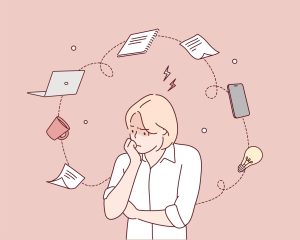Teachers Shouldn’t Call on Students: The Negative Effects of Cold Calling
January 3, 2023
Imagine this scenario: Silence. If someone were to drop a feather on the floor, everyone would hear it. This describes the status of the room after the teacher called on you. And before that, you were casually taking notes and listening to the lesson. Hearing your name felt like an electrical shock waking you up and erasing everything from your brain as it passed through your body. You replay the question in your head, but nothing comes to mind. hurry up. everyone’s waiting on you. This voice in your head won’t stop haunting you. HURRY UP! You know the answer, just think. The heat moving down from your forehead to your hands distracts you as the teacher calls your name again. she thinks you weren’t paying attention. just answer it already. just say anything. Your entire body feels numb except for the pounding of your heartbeat as if it’s trying to jump out of your body. You keep staring down to avoid eye contact with the teacher and eventually she calls on someone else. Thoughts flood your brain. the teacher controls your grade. they probably hate you now. why didn’t you just answer?
You continue to sit in your seat but refuse to lift your head up in fear that everyone is staring at you. The heat once on your forehead and hands has moved to your cheeks like a disease. Thoughts continue to overload your brain. all you had to do was answer. what is wrong with you? now everyone thinks you’re dumb. just pretend it didn’t happen. look up. pretend. you can’t change the past. You look up and the lesson has been continuing as if you’d never been called on, but you know you had. Everyone did. And that’s all your mind could think about throughout the entire lesson. Continuously, you look up at the clock and hope the bell would just ring. please just ring already. five more minutes. damn it. However, when the bell rings, that anxiety isn’t gone. In fact, it stays with you on your way home and back to school the next day.
Finding yourself in a situation such as this isn’t uncommon at Great Neck South High. Many people get nervous when called on during class; however, it’s the aftermath of not knowing the question that mentally drains students as they get more embarrassed and start to overthink.
Houston Methodist, a website concerning articles on health advice, contains a statement from Dr. Fowler, a specialist of psychology who graduated from the University of Tennessee and trained at Harvard University. He states that overthinking keeps “you from enjoying the present moment” and can lead to “anxiety and depression.” Furthermore, this article lists physical symptoms of overthinking which includes fatigue, headaches, nausea, and trouble sleeping. Clearly, the side effects of overthinking cause harm that can be caused by cold calling on students.
Embarrassment can also lead to anxiety, which creates performance issues in the classroom. Students fear experiencing the same uncomfortable situation again. Very Well Mind, a website containing articles on health and wellness information, states that “Failure is accompanied by a variety of emotions: embarrassment, anxiety, anger, sadness, and shame, to name a few. Those feelings are uncomfortable, and many people will do anything they can to escape feeling emotional discomfort.” This suggests that by calling on students, they’re pushed towards giving up instead of trying again.
However, there are ways to cope with embarrassment. BetterUp, an online website that invented virtual coaching as the largest mental health startup worldwide, suggests people to be kind to themselves, confront the situation, have a laugh, take deep breaths, and/or talk with a friend.
In spite of these negative effects resulting from cold calling on students, many still say that the aftermath of being called on is part of the learning processes and that calling on students can be beneficial; however, this is not always true. If a student continuously gets the answer wrong, the teacher will either tell them the right answer or call on someone else to give the right answer. Unless the teacher explains how to get the answer, the students only know that 1) their answer is wrong and 2) what the correct answer is. Therefore, they aren’t benefiting from getting the question wrong.
Furthermore, giving students the opportunity to raise their hand should always be the first option opposed to calling on students. This allows students to prepare themselves and feel confident in their answer, rather than feeling pressured. It’s understandable that teachers may feel the need to call on students to stimulate participation in their classrooms; however, there are ways to do this that don’t negatively affect students. For instance, giving hints toward the right answer can give students confirmation whether their answer is right or wrong and therefore encourage them to raise their hand. It may take up more class time, but more importantly, it helps students avoid having to face embarrassment, overthinking, and anxiety. Furthermore, it helps create a welcoming class environment that promotes students to voluntarily answer questions, while encouraging them to take the risk themselves. However, if still no one raises their hand and the teacher feels the need to call on students, praising students even when they’re incorrect or don’t know the answer to continue to encourage them to try. Understood, an online resource that allows people to learn “at home, in school and in life,” states that “Praise is one of the simplest and most powerful tools to engage and motivate your students. When used effectively, praise can turn around behavior challenges and improve students’ attitudes about learning.”






